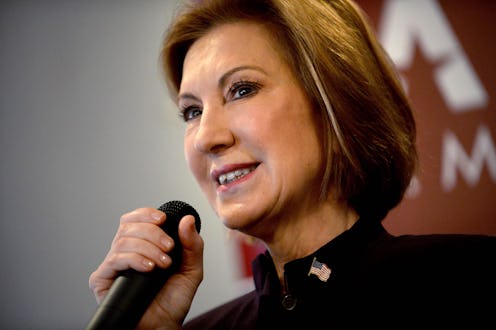News
Does Gloria Steinem Care About Carly Fiorina?
Finally putting her campaign out of its misery, Carly Fiorina dropped out of the Republican race for the presidential nomination on Wednesday. Few were surprised that the former HP executive had called it quits — if anything, people were surprised that she stayed in the race as long as she did. After finishing seventh in the Iowa caucus with just 1.9 percent of the state's Republicans backing her, she soldiered on to New Hampshire, where she again finished seventh, with 4 percent of the Granite state's vote. However, there was one surprising element to Fiorina's announcement that she was withdrawing from the race for the White House: She went, as conservative Iowa radio host Steve Deacon would say, "full vagina" on us.
In her official statement, Fiorina played up feminism in a way that was almost entirely absent from her campaign. Although Fiorina first addressed her fellow Republicans, she devoted a significant portion of her message to women:
To young girls and women across the country, I say: do not let others define you. Do not listen to anyone who says you have to vote a certain way or for a certain candidate because you're a woman. That is not feminism. Feminism doesn't shut down conversations or threaten women. It is not about ideology. It is not a weapon to wield against your political opponent. A feminist is a woman who lives the life she chooses and uses all her God-given gifts. And always remember that a leader is not born, but made. Choose leadership.
It was certainly a bold statement, and Fiorina's effort to challenge preconceptions about what constitutes a "true" or "genuine" feminist has come up before on the campaign, though not frequently or in a pronounced way. CBS reported that last June that at the Competitive Enterprise Institute dinner, Fiorina said, "A feminist is a woman who lives the life she chooses. We will have arrived when every woman can decide for herself how to best find and use her God-given gifts. A woman may choose to have five children and homeschool them. She may choose to become a CEO ... or run for president."
As we conduct the postmortem on Fiorina's campaign, her final note may change the way people remember it. Women, especially feminists, did not have big debates about whether they were compelled to vote for or lend some level of public approval for Fiorina because she was a woman, the lone female candidate in the GOP pack.
Perhaps the absence of such debate around Fiorina deserves some scrutiny in light of Gloria Steinem's lightning rod comments on HBO's Real Time with Bill Maher about supporting Hillary Clinton. "When you're young, you're thinking 'Where are the boys? The boys are with Bernie,'" she told Maher. Her remarks were initially construed as a jab at young women, specifically feminists, who support Sanders over Clinton. She later apologized and said that she "misspoke," saying that she believed a woman could be a feminist and support either Democratic candidate: "Whether they gravitate to Bernie or Hillary, young women are activist and feminist in greater numbers than ever before."
Even after Steinem corrected herself, her remarks continued to spur thoughtful and interesting debate among feminists about whether they were obligated to support Clinton over Sanders. No such dialogue (or at least, not any with such vociferousness or visibility) was held over Fiorina's candidacy. In hindsight, that silence is deafening.
Of course, there are ways to explain this. For one, even before her campaign officially started, Fiorina made Clinton her main target. Bustle's Cate Carrejo argued that Fiorina's jabs were part of a "catfight-like attitude toward Clinton" and perpetuated sexist attitudes. Moreover, Fiorina has been pointedly anti-abortion and anti-Planned-Parenthood in her campaign for the Republican nomination, which many would argue discounted her as a feminist candidate right from the get-go.
These concerns should not at all be discounted in evaluating Fiorina's campaign, and certainly not in evaluating whether she was a candidate who would have been a good president for women and feminists. Still, the absence of pretty much any debate over whether feminists or women in general should rally for Fiorina — even if such support was relative to her fellow Republicans — is curious, and perhaps suggests a double standard in regards to feminism between Democratic and Republican candidates.
Some may simply argue that Republicans can not ever be supportive of feminist ideals, but I would fight a conception that draws a line that forces out all women (and men) from embracing feminism if they choose to align with the GOP. Making "feminist" the exclusive label of a specific party is bad for feminism, and what feminists must fight against. Feminists are constantly stereotyped as looking, thinking, and acting a specific way, and that hurts the movement.
To her credit, in the concluding words of her campaign, this was the point Fiorina made. Then again, she also said that feminism is not a "political weapon" or a reason to "vote a certain way or for a certain candidate." She probably doesn't give a toss about whether Steinem or any other person considers her a feminist — that would go against her conception of being a feminist.
